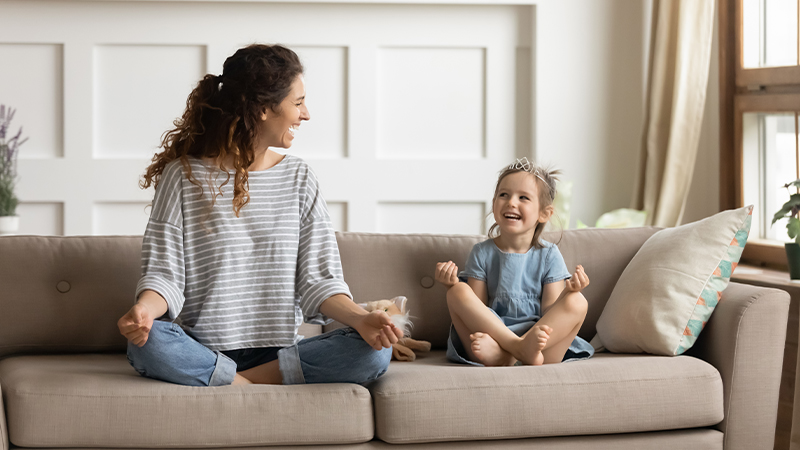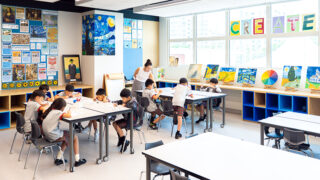If you and your children have been feeling a rise in stress levels caused by the challenges of last year, you’re not alone. DR SANVEEN KANG from Psych Connect shares her knowledge on how we can help children deal with stress and manage it better.

What impact did the events of 2020 have on children you support?
It has been difficult on many fronts:
• Disruption of school and home life. Children work well when there are boundaries and structure in place; the merging of the two main structures of their lives blurred this boundary and made it hard to maintain any form of structure.
• Disruption of social relationships and extra-curricular activities. Children process emotions through play and activities. For a large part of 2020, children were denied their one main coping mechanism.
• Increased parental anxiety and increased conflict in some homes. Last year saw not only increased concerns about job securities but more pressure with balancing work and the demands of being a parent at the same time.
• In some households, there has also been an increase in conflict and substance abuse as people have been disconnected from their support systems and coping mechanisms.
How much do children “pick up” from their parent’s moods?
Children model parents. It’s important for parents to recognise that they play a huge role in their children’s emotional and psychological wellbeing. Children pick up on the slightest changes in their parents’ mood and behaviour. Some children internalise these changes and feel responsible for their parents’ wellbeing.
What are the common issues you’ve seen due to the 2020 challenges?
There’s been a spike in anxiety, depression and behavioural escalations. Adults have started to report increased fatigue and burn out, and children are reporting increased bereavement as they are missing their loved ones at home, and the usual routines of travelling or going home for the holidays have been disrupted.
Some children have also reported increased anxiety of mortality (their own and their family’s) along with fear of illness. Many adults may also be facing increased levels of alcohol and drug use, insomnia, depression and anxiety.

How do children handle change?
Neuroscience and developmental research repeatedly shows that the early years before age five are foundational for setting up optimal lifelong development. Facing transitions is a daily dilemma for young kids, even as it presents the opportunity for lifelong skills to grow. Young children have difficulty with change – and even with transitions, as they are a type of change.
Most of us prefer consistency, and to have things stay the same. Comfort comes in knowing what to expect. Children also take cues from parents about what’s safe and what’s not. Hence, your child will look to you to help them cope with change.
What are your thoughts about structure at home for children?
Children respond well to structure and consistency. Set a routine and follow a schedule. Allow your child free time to be creative too, and remove devices during this time.
What role does creativity play for children to combat stress?
Art can be so powerful because it makes you escape for a little bit, it puts you in that mindfulness zone, and time passes so quickly. My encouragement is for parents and children to get creative together. Take time out of your busy lives by doing something like cooking, crochet or colouring-in with your children.
What warning signs should we look out for with our children?
The following are a few of the child behavioural warning signs to watch for:
- Becoming excessively clingy
- Showing a regression in self-soothing or co-regulation abilities
- Sudden displays of uncharacteristic disobedience or defiance
- Sudden or dramatic changes in behaviour
- Complaints of headaches, fatigue and stomach pains, particularly in younger children
- Increase in nightmares or sudden bedwetting
- Difficulties concentrating and increased hyperactivity
- Particularly among older children, an expression of wanting life to end (for example, “I would be better off dead” or “I wish I were dead”) or increased risk-taking and experimental behaviour
Rather than focusing only on your child’s behaviour, consider asking yourself this question: “What are they trying to communicate to me?”
Why is it important that we don’t ignore such warning signs?
Your child is intuitively trying to communicate their challenges to you. Some children don’t have the words to communicate as they may be too young; others aren’t aware that they are struggling yet. Without finding ways to cope, emotional challenges do not go away. Instead, they build up. We also know that intervening early means that we can work on the challenges in a shorter period of time.
What conversations should we be having with our children about any likely challenges during 2021?
We should be talking about change, and the expectations we’re all holding for 2021. What are our hopes? What are our worries? What are some tools that we have in our coping tool box?
I advocate the four-step golden rule: Talk; Listen; Offer Choices; and Let Them Be Upset. Over time, this approach creates a safe space for emotional processing and expression.
I encourage us to look for the silver lining and focus on the positives and the things we learned from 2020.
If your family needs support, you can access free resources at psychconnect.sg or contact Psych Connect at 6493 0244 or 9109 2024.
This article first appeared in the January 2021 edition of Expat Living. You can purchase the latest issue or subscribe, so you never miss a copy!
Don't miss out on the latest events, news and
competitions by signing up to our newsletter!
By signing up, you'll receive our weekly newsletter and offers which you can update or unsubscribe to anytime.



